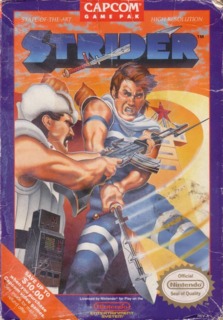A slash-and-kill title that makes you think a little. A poor man's Metroid. I love it.
A lot of things set this game apart for me. First off, the plot (simple though it may be) isn't just thrown in the forgotten game manual and occasionally, vaguely referenced in the course of playing. ("Sorry Hiryu, but your comrade is in another castle.") True to most of Capcom's other efforts, letting the game idle at the title screen gives you a tiny pre-game briefing on the Striders. When you start the game proper, the very first thing you get is a brief exchange which tells you what's going on. But the game doesn't leave it there, no no! Throughout the course of the game you'll uncover clues (recordings) that you need to watch in order to figure out where to go next. Most of these advance the plot in some way, possibly by throwing in a plot twist you might not expect.
The second thing I really like: backtracking! Yes, I know, that's usually annoying, right? Well not the way it was done in Strider. Rather than just having to stroll back to the same room you've been to a hundred times in the course of a single playthrough, Strider has you backtrack in order to enter new areas of old levels. If you're like me, every time you pass by a fork in the road (or fortress, whatever) you want to know what's down there. In Strider you wind up going down about 85% of the "other paths" that you see after getting a key, or boots that let you walk on water, or something.
The game also doesn't exactly lead you by the nose. While there's really only one path you can take to play through and beat the game, often you have to remember what level it was that had a specific security door number in it, or which had some random, weird "thing" that might work with the new equipment you just got. You're free to revisit previous levels any time you like and collect secrets, though since your health and energy replenish between teleports this isn't nearly as useful as it sounds. However, if you miss one of the few optional pieces of equipment (a total of two, and one isn't really optional at all) you can go back and pick them up.
Finally, the overall game mechanics are just fun. The simple leveling system is rewarding, making you feel like you've made real progress. Transport tubes are a neat way of getting around levels, or even from level to level. Rather than being mysteriously transported a-la Star Trek, Strider has you zipping around pneumatic tubes like a 1930s mailroom, but with more slashey death. It may be simple, but it's undeniably cool. The slashing mechanic is nice as well; rather than shooting your foes to death, you have to get up close and personal. It adds a nice touch, a "prevailing above all odds" sort of feel, even if the game AI is simple.
Now with all that neat stuff there are a few bad things to speak of. First and foremost, the game is short, maybe 2-6 hours, possibly less. I'll admit that not everyone wants a very long game, but the inherent, Metroid-esque complexity to the game would work better if you had to play through a few more levels and maybe unlock some more secret areas.
Secondly, triangle jumping sucks. The "triangle jump" is Strider's version of a wall jump, and while it's neat that the feature was implemented in a relatively simple game system, it was implemented poorly. The manual's directions are of no help and don't even accurately reflect how to perform the maneuver. What you wind up doing is jumping at a wall, hammering the jump button as you press away from it and hoping like hell you'll make it work this time. Hiryu also drops suddenly when pressed against a wall even when you do the jump properly, which is disappointing and frustrating if you think you screwed it up, or are expecting more height. I'll admit that this seems like a lot of focus to be given to one single, minor movement ability, but it's also REQUIRED to complete the game, and not only that but in a very early level. Young players (like I was when I first played the game) usually just CAN'T do it, leaving them stranded at what is, in essence, level 2.
Third, when you level up you are granted special abilities, most in the form of a pseudo-weapon you can use instead of your cipher (slashey death sword) for an energy cost. The problem is that these abilities are far too costly for what they do. The most useful of the offensive abilities, spark, only lets you throw out a maximum of 20 moderate damage sparks, not even one-hit killing sparks, before you've completely exhausted your energy supplies at the highest level you can reach in the game. Enemies don't typically drop energy refills either, so for the most part when you're playing you wind up hording your energy to use for one of the three healing abilities.
Overall, Strider is a pretty fun and enjoyable game, reasonably satisfying to play through, and a departure (in a good way) from the rest of the series. If you like Metroid for its complexity, but not how INCREDIBLY complex it was, Strider may be more to your liking, and if you LOVED Metroid then you'll probably REALLY ENJOY Strider.

